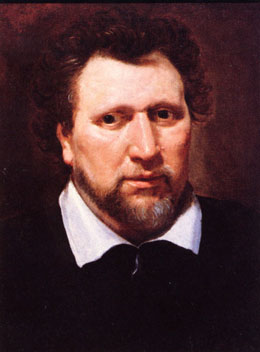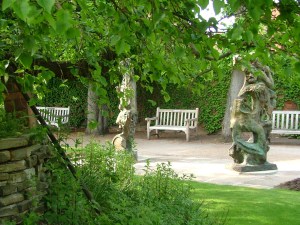So I saw “Anonymous” this weekend.
I’m not going to lie and say that I tried to be objective going into this film. I

De Vere and Shakespeare
didn’t. I walked in ready to hate every molecule of every bit of every piece of it. I walked in ready for a fight; armed with my rapier/quill of righteousness and my shield of Bardic faith. I walked in and plonked myself in that seat as a professional obligation; knowing that I had to see this for the good of those around me and as an educational experience to enrich my own knowledge of current events in my field.
The movie opens with a framing device. Derek Jacobi is late to a lecture in New York City. We follow him through the streets as he gets out of his cab and enters the theatre, then immediately hops onstage to begin his story. The theatre in which he lectures is a giant, sumptuous, velvet-decked place of mythos (a Broadway house like that would never be given over for a lecture on Shakespeare). The lecture sequence is filmed from the perspective of the house (though with a few close-up shots of Jacobi’s face) giving us the feeling of sitting in that theatre, listening to that story. Jacobi presents the pre-cursor to Oxfordian evidence with a straight face and a charming accent (of course, in a situation where there is no one to defend the evidence it seems to pile against our beloved playwright). His last words before we cut to the first internally nested loop are “what if there was another story?”

Ben Jonson, England's first poet Laureate and compiler of the First Folio
Cut to Ben Johnson taking refuge in the trap door of the Globe theatre with a pile of manuscripts as he hides from a pursuing armed guard. Unable to find Johnson, they torch the theatre. Johnson is eventually captured and detained for questioning and we cut to another flashback.
The plot evolves this way in layers, too transparent and insubstantial to truly determine where in time (and sometimes place) one is in the story. At one point, we find ourselves inside a play within a flashback of a flashback of a flashback of a framing device.
A second problem lies in the lack of clearly differentiated characters. For the most part, the Earls and Noblemen are interchangeable… except when they’re not. The problem there, of course, is how do you tell apart someone who hasn’t been saliently understood to begin with? The lack of characterization leads to a lack of caring and that lack of caring leads to a disengagement with the over-arching plot (or plots, in this case). Fine politics becomes impossible to follow when all noblemen are created equal.
I went in expecting the screenwriter to play fast and loose with history (which he did). I was surprised by the amount of historical events which he managed to conflate within the film (of course, the actual timeline of history was completely and utterly altered, but who cares for the space-time continuum?). The burning of the Globe (actually June 29, 1613), the Essex rebellion (actually 1601), the publishing of Venus and Adonis (actually circa 1593), the death of Christopher Marlowe (actually May 30, 1593), and the writing of Shakespeare’s plays themselves set forty years before the main events of the film (actually sometime between circa 1589-1613) are just a few instances of the incredible shifting timeline which John Orloff weaves.
There were a few cute nods built in (like the inclusion of famous portraiture in the backgrounds of scenes, often these portraits depicted the historical individuals whom the foregrounded actors were also playing, or the almost-requisite autograph scene in which De Vere attempts to figure out how to sign his name as “William Shakespeare” of course playing upon the signature theme which I was going to say that I have previously explained on this blog, but then realized that it was via a lengthy facebook post… so see the footnote to this post for it*). And I must admit, it is refreshing to hear a new explanation for the dedication of Venus and Adonis. Also the film does include one of the greatest portrayals of James I that I have ever seen. Ever.
But on the whole, the movie was an apathy-fest. I had trouble caring about the film, I had trouble wanting to care about the film, and I almost felt bad for the film. Far from being the tour-de-force attack that the scholarship community has built this movie into, it is a flimsy film which simply won’t hold up under the light of scrutiny. If someone truly tried to pick this apart, it would simply dissolve into a heap of dust.
To most scholars, the most troubling part of the entire “Anonymous” fiasco

Of course... if the Doctor had actually managed to be there, we could solve this whole darn authorship debate. What I wouldn't give for a TARDIS.
was the simultaneous release of lesson plans for schools. That absolutely baffles me. After seeing the film, I am convinced that you may as well teach “The Matrix” at a Computer Science program. There are films which have been made, meticulously researched, and could be used to teach Shakespeare (“Shakespeare in Love”, I’m looking at you). I think our greatest fear was that “Anonymous” would be one of them. After having seen it, I can say with certainty that our fears on this account were ungrounded. Any film which depicts Ben Jonson as a struggling writer unable to make worthwhile prose can dive into the depths of the circular file and hide under my yogurt lids.
In fact, I’d almost like to hear someone defend this film. How can you justify something like this? Not because of the ideas it disseminates, but because of its sheer sloppiness…
So go on. Try to hold this up as historical fact. I dare you.
*William Shakespeare was the son of John Shakespeare and baptized April 26, 1564. The church records the spelling of his name (both at that time, as well as upon his burial and the burial of his children) to be “Shakspere”. Early Modern Spelling is a fluid matter really, so this could (or could not) be evidence of any import. The spelling “Shakespeare” is believed by some to be a “fancified” version of Shakespeare’s name to refer to the Great London Playwright as opposed to the man from Stratford and came into vogue during Shakespeare’s lifetime as the most commonly-used spelling in publications of that period. Certainly there is evidence of this in documents that we have; often when the documents were directed at William Shakespeare, the hum drum guy from Straford, the name was spelled “Shakspere” (as noted above) or “Shaksper”. We have only six surviving signatures of Shakespeare’s and almost all of them spell the name in a different way (though this is likely due to accepted legal abbreviations of the time). “Shakp”, “Shaksper”, “Shakspe”, “Shakspere”, and “Shakspeare”. As to the etymology of the name, it has been put forth that perhaps Englishmen were named after the weapons which they carried. Shakespeare’s paternal grandfather, Richard Shakespeare, was mistakenly referred to as “Richard Shakstaff” in a 1533 record (perhaps lending credence to this argument, or noting a particularly useless scribe). What is unscrupulous about all of this is that Shakespeare most definitely did not make the name up for himself, though he probably shifted the spelling of it depending on what he was doing at the time.



